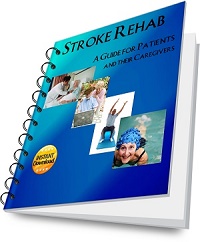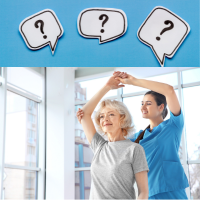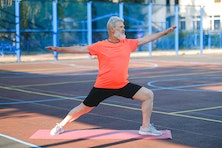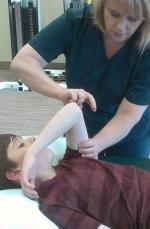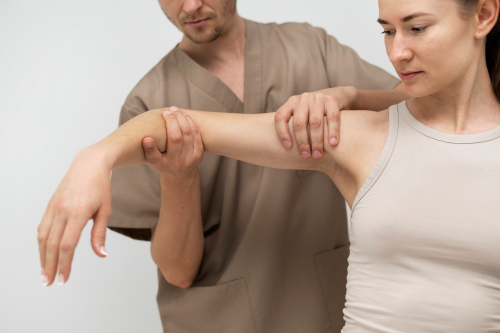Fatigue After Stroke
Medically reviewed by Karen Murray, OT, CHT, CSRS - written by Stroke-rehab.com
It is common to suffer fatigue after stroke (also called post stroke fatigue) and can occur even after mild strokes or TIAs. Fatigue is different from normal tiredness, as it doesn’t necessarily get better with rest. In fact, increased mortality has been identified in those that experience post stroke fatigue and depression especially in those who are single and don't have a good support system. The following are suggestions to help combat fatigue due to stroke:
1) Examine all medications taken, and make sure fatigue is not a side effect. If it is, ask your MD if there is an alternative medicine that doesn't cause fatigue.
2) If sleep is being disturbed, discuss medications or herbal remedies with your physician that might help improve sleep.
3) Make sure all medical conditions are being managed. A bloodwork check might point to other factors that could contribute to fatigue (i.e. anemia, problems with blood sugar, etc.)
4) Stay fit. According to studies, exercise helps improve depression/fatigue. Aquatic exercise or walking may be good alternatives. Find an activity you like that will promote improved fitness.
5)Check with your MD to see if you have clinical depression which may need treatment with medication or counseling.
6) Socialization is important. Try to get involved in activities that require socialization with others.
8) Practice cognitive exercises that will help combat mental fatigue. This could be crossword puzzles or simply playing games with others.
9) Use Energy Conservation Techniques. These techniques are used to make daily tasks more manageable:
- Prioritize Activities: Prioritize essential tasks based on importance and energy level. Save energy for the most crucial activities.
- Plan Rest Breaks: Schedule short rest breaks between activities to recharge.
- Use Assistive Devices: Utilize mobility aids, such as canes, walkers, or wheelchairs, to reduce physical strain while moving around.
- Sit for Tasks: Whenever possible, perform tasks while sitting down to reduce the physical effort and conserve energy.
- Organize Items: Arrange commonly used items to provide easy access. Avoid the need to bend, stretch, or reach excessively. For example, place dishes often used at waist to shoulder height rather than on a high or low shelf.
- Use Adaptive Equipment: Utilize reachers, dressing aids, or jar openers to make daily tasks easier.
- Pace Activities: Break larger tasks into smaller, manageable steps. Pace yourself and avoid rushing. For example during bathing - 1) Gather clothes then rest 2) Undress seated in chair 3) Take shower using shower bench 4) After shower, put on absorbent robe and rest while robe does most of drying for you 5) Get dressed at your own pace.
- Delegate and Seek Help: Don't hesitate to ask for assistance when needed. Friends, family, or caregivers can provide support with tasks that are energy-intensive.
- Avoid Overexertion: Stop an activity if you start feeling fatigued or in pain. Pushing through can lead to further exhaustion and potential injury.
- Easy Meal Prep: Opt for easy-to-make meals or use pre-cut, pre-packaged ingredients to minimize the effort required for cooking.
- Work at Proper Height: If standing, try to use raised countertops, tables, or workbenches to reduce the need to bend or stoop while working. If in a wheelchair, make sure items are low enough to reach comfortably and use lower surfaces.
- Clothing Choices: Select comfortable, loose clothing that is easy to put on and take off. Adaptive clothing or devices like elastic shoe laces or magnetic buttons can make dressing easier.
- Hydration and Nutrition: Maintain proper hydration and a balanced diet to support energy levels.
- Stay Organized: Keep a calendar to plan activities and prevent last-minute rushes.
Other Resources
You can access this pdf handout from The UK Stroke Association which better explains post-stroke fatigue or visit their website.
Newsletter Sign Up
Receive Stroke Recovery Tips, our online quarterly newsletter. Sign up below for free tips on exercises, resources, latest technology, apps, research and more!
To view past issues of Stroke Recovery Tips, visit https://www.stroke-rehab.com/Stroke-Recovery-Tips-BackIssues.html
As an Amazon Associate I earn from qualifying purchases.
Recent Articles
-
How to Make Neuroplasticity Repeatable On Demand
Submission from reader: Neuroplasticity is widely touted as a way for stroke survivors to recover. To make it repeatable on demand, what exact signal is -
Only Plays Internet Games and Nothing Else Three Years Post Stroke
Question: I know playing games for up to 8 hours on the internet is not healthy for anyone. Does anyone know how sitting all day long playing games on -
Sadness After Stroke
I Get Sad Question:I get so sad at times like I lost the old me, I was very active and now I’m not, I’ve had a complete meltdown and just sobbed. Answer: -
More damage done to paralyzed left arm as a result of carelessness.
Question: My husband suffered a stroke which caused his entire left side with no feeling or movement. Recently, my husband possibly could have been turned -
Shouting, Confusion, and Anger After Stroke
Question from reader: My mom had a stroke about a month ago. Physically she is improving, but she has bouts of anger, confusion (says weird things), and -
Cloudy vision after stroke
Question: My mother had a stroke 1 yr ago. It caused partial loss of vision on her right side. During a 4 day road trip, her vision would get cloudy and -
Flaccid Paralysis After Stroke
Learn about stroke treatment for flaccid paralysis after stroke. -
Vision Problems After Stroke
Answers to patients' questions about vision problems after stroke and treatment. -
Symptoms Getting Worse After Stroke
If you experience sudden declines or changes after stroke, you should seek medical attention. -
Flaccid Paralysis Treatment After Stroke: Questions and Answers
Answers to questions about flaccid paralysis treatment after stroke including home exercises and treatment ideas.
